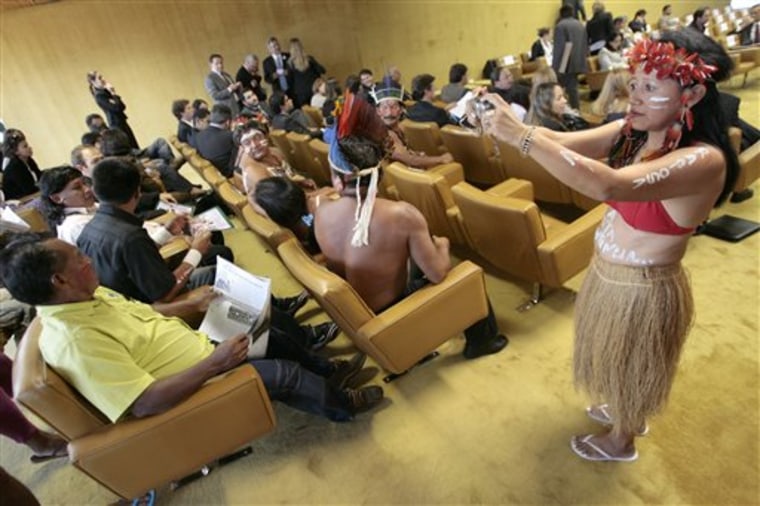Brazil's Supreme Court sided Thursday with Amazonian Indians in a land dispute that turned violent last year when authorities tried to evict rice farmers from a government-decreed reservation.
The court ruling upholds the 4.2 million acre Raposa Serra do Sol reservation for 18,000 Indians who lay claim to their ancestral land, despite a handful of large-scale farmers who also occupy the territory in the northernmost reaches of Amazon jungle bordering Venezuela.
While the ruling solidifies Indian rights, detractors said it does nothing to prevent another violent outbreak.
"There is no peaceful solution," Nelson Itikawa, president of the Roraima Rice Growers Association, told the government's Agencia Brasil news service. "It's possible there will be a conflict — there are people who will lose control."
Though the dispute involves only a few thousand people in remote Roraima state, it represents a large divide among Brazilians over land development and sovereignty.
A long history of repression of Indians and paranoia about international intervention in the Amazon loomed large in the case, said Brasilia political analyst Alexandre Barros.
"Old sins have long shadows, and there are a lot of sins on all sides that complicate this case," he said.
National integration
Roraima leaders — including an Army general who threatened to defend the farmers in defiance of national law — have said that leaving the reservation in Indian hands is a threat to national security and strangles economic growth in the sparsely populated state.
Rice farmer Paulo Cesar Quartiero, who grows rice and soybeans and raises cattle on 22,700 acres, accused the court of bowing to "foreign interests" that purportedly want to control the Amazon and its natural resources.
"The court has endangered our national sovereignty," he said, adding that the ruling "means the forced exodus of at least 600 men, women and children."
Quartiero said he and other farmers would abide by the court's ruling and not resist "this shameful eviction."
Quartiero has been jailed twice for resisting eviction — once for blocking a federal highway and again on weapons charges after his ranch hands shot and wounded 10 Indians.
Other farmers burned bridges and hurled Molotov cocktails at authorities when they tried to evict them last April.
The court stopped the relocation that month, saying it could escalate into civil war. Justices voted 10-1 in favor of the Indians on Thursday.
Everything was calm after the ruling, said Jose Negreiros, federal police spokesman in the Roraima city of Boa Vista.
"There have been no demonstrations for or against the reservation, and nothing has happened to justify beefing up security near the reservation," he said.
Land grant
To ease tensions, President Luiz Inacio Lula da Silva in late January ordered 14.8 million acres of federal land handed over to Roraima state. The state governor said it could be used to resettle the rice farmers.
But Itikawa said the land grant was not large enough to accommodate roughly 50 farming families, nor fertile enough for them to maintain production levels.
While Brazil's 1988 constitution mandated the demarcation of Indian lands within five years, the Raposa Serra do Sol reserve was not created until 2005, and the government still has not enforced its borders.
Indians hold about 11 percent of Brazil as a whole — a nation of 190 million people that is nearly as big as the U.S. — and 22 percent of the land in the Amazon, an area increasingly sought by farmers producing some of Brazil's biggest exports — beef and soy.
Future of Amazon
Indian rights groups also have called the case pivotal for determining the future of the Amazon, a rainforest the size of western Europe that scientists say provides a critical cushion against global warming.
They say giving the Indians stewardship over vast tracts of land results in less rainforest destruction.
"They use the reserves in a sustainable manner — everybody is fully aware you can't just go in and chop down the rainforest because it cannot be replaced," said Fiona Watson, the Brazil coordinator for London-based Survival International, which works to protect indigenous people around the globe. "The indigenous land serves as a buffer against deforestation."
The president of the Supreme Court said it was a precedent-setting ruling for Indian land rights.
"We've never had this deep of an analysis on the subject, and we've established a statute that has to be applied no only in the Raposa Serra do Sol case, but also in other cases of demarcation," said Gilmar Mendes.
The court must still rule on 18 additional measures that the Indians will have to abide by to keep the land — including one that would allow military bases on the reserve.
More on:
